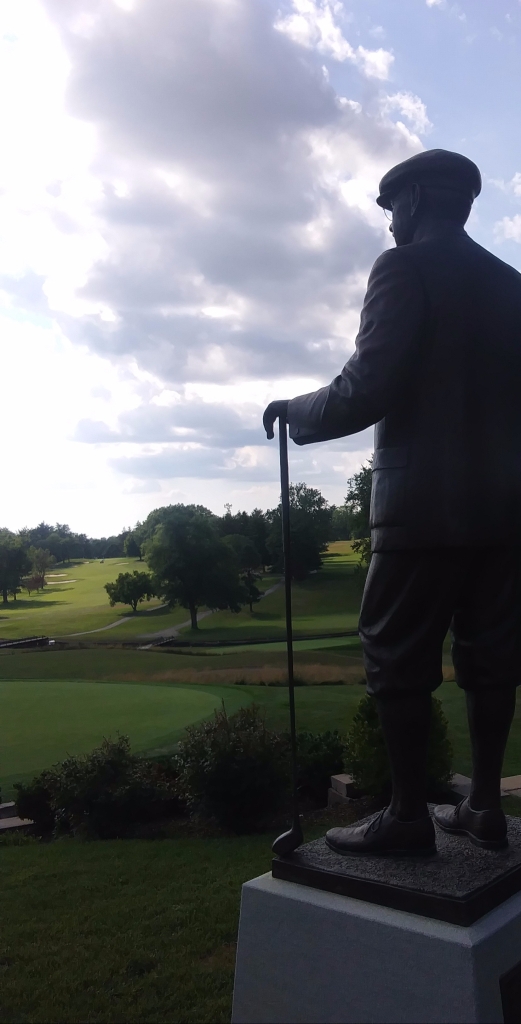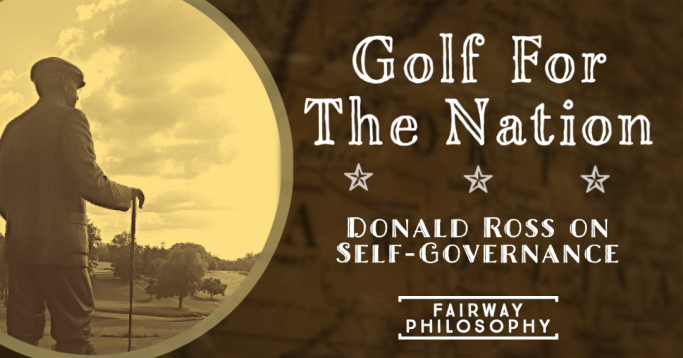“A country which gets golf-minded need not worry about the honor, the integrity and the honesty of its people.” –Donald Ross
I had before me the other day a short par 4 that dog-legged to the right. The right side of the hole was tree-lined, and a creek ran about 30 yards in front of the green. In other words: if you want a clear go at the green on your second shot, stay left off the tee. I went right.
Now in recovery mode, I hit a solid punch with a 7-iron that glanced off a tree branch, snuck over the creek, and settled directly in front of a curiously placed plant with fanning foliage. I don’t recall ever seeing this instance of flora before, and hope never to again. There was no conceivable shot that didn’t doubly bristle through its leaves. So after a few perfect practice swings—how often the case!—I duffed my first attempt. An actual duff. The ball moved about an eighth of an inch (.3175 cm, for European readers). The second attempt resulted in a squirty sort-of shank into a green side bunker. Lo and behold, I got up and down for what felt like a complicated double bogey.
After the hole, my playing partner keeping score says to me: “That’s a great bogey; seriously.” He taking my duffed attempt as yet another perfect practice swing. As much as I wish it had been the case—the “great bogey” being one of my favorite scores—I had to admit to my inept double. Erase that noble five, and slap a six on the card, my friend.
Now, why should you reading this care at all about a rather regular occurrence on the course? My intent in including this commonplace confession is to support the above-recorded point made by the venerable Donald Ross. A “golf-minded” player will certainly be guided by “the honor, the integrity and the honesty” the game demands, expects, and inculcates. (This anecdote, in case it’s not clear, is certainly not to extol my virtue—should there be any—but rather that of the game.)

Golf stands as a practice—among any number of other similar practices—that is of its very constitution fashioned in a way such that pursuing the ends or goals of the game, as it is meant to played, one at the same time incurs an increase in certain traits of character. That is, virtues, excellence or strength of one’s person. These virtues not only enable us to meet the demands that are by nature internal to the game we play, they in turn better us beyond the confines of the course. And given the social nature of golf, these virtues orient us better toward those with whom we walk the course, as well as the byways of the broader world.
Or such is the ideal. Like all ideals, failure to meet them shows up in manifold ways. But to have the opportunity to get a stroke or two past the notice of one’s playing partners—“no one saw that swing, or would see me drop a ball here, or give this one a little nudge away from this tree root”—and not do so, this requires no act of courageous goodness or sacrifice, just the common everyday decision for truth, fairness, and goodness that provides for a civically healthy people.
To consider Ross’s line more fully now, the notion of golf improving the quality of a people’s character might at first seem far-fetched. We might ask: how could it be that the ins-and-outs of a game, a seeming trifle, shape and form the people of a nation for the better, let alone to the degree asserted by Ross above?
The line comes from a collection of Ross’s writings titled, Golf Has Never Failed Me. In an entry titled, “Do Golfer’s Need Rules?,” which is more aphorism than essay, Ross upholds the ideal of golf as a gentleman’s game, one where “every golfer is on his honor.” As such, then, golf doesn’t require more rules than are necessary. We should never seek to “control the game completely.” Golfers don’t need a slew of laws because they are ideally, in effect, a law to themselves.
That is, should the spirit and dictates of honor be instilled, fostered, and kept alive and well, golfers don’t need numerous and cumbersome external constrictions. Having interiorized the authentic spirit of the game, they govern themselves. And while Ross doesn’t use the term self-government here, it’s clear that this is what he has in mind.
As he pursues this line of thought further: “the game does more to bring out the finer points in a man’s character than any other sport.” Considering his time at Pinehurst, he continues, “I know of only two instances of a golfer cheating, two out of hundreds of thousands.” And so Ross can conclude: “a country which gets golf-minded need not worry about the honor, the integrity and the honesty of its people.”

It’s these practices that we engage in, such as golf, those that some erroneously see as trivial and superfluous, that inculcate in a people—its practitioners—virtues and attitudes that contribute not only to an individual’s flourishing, but, given that these activities are social in nature, the individual’s particular growth in excellence of character can only contribute to the wellbeing of the social whole. More specifically, traits like honesty, fairness, integrity, patience, determination—those that are particularly helpful in golf—are clearly not just to the increase of an individual, but are socially beneficial.
To get back to the idea of self-government, a society of men and women who are able to virtuously govern themselves—their thoughts, desires, passions, emotions, attitudes, and actions—toward the good, makes beneficial self-governance in the broader, more communal and political sense, all the more possible and likely. This is the double-layered meaning of the term “self-government.” As Matthew Crawford puts it in his fascinating Why We Drive, the modern “liberal-republican” political tradition “holds that a people worthy of democracy must be made up of individuals capable of governing their own behavior in the first place, and have therefore earned their fellow citizens’ trust.”[1]
It is in a practice such as golf—as Donald Ross so aptly observed—that the habits and customs that shape a life lived well with others are fostered and given opportunity for expression. As a result, ideally, we see an increase in mutual trust and ease of social life. In light of this, we can say with Ross, that a nation can only benefit from her people being “golf-minded.”
[1] Crawford’s book sees the phenomenon of driving as a particularly rich arena wherein one might think through political, existential, ethical, and aesthetic questions. I reckon that golf is another such field ripe for philosophical exploration.

